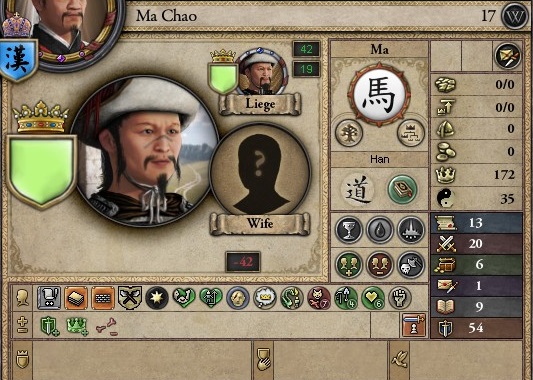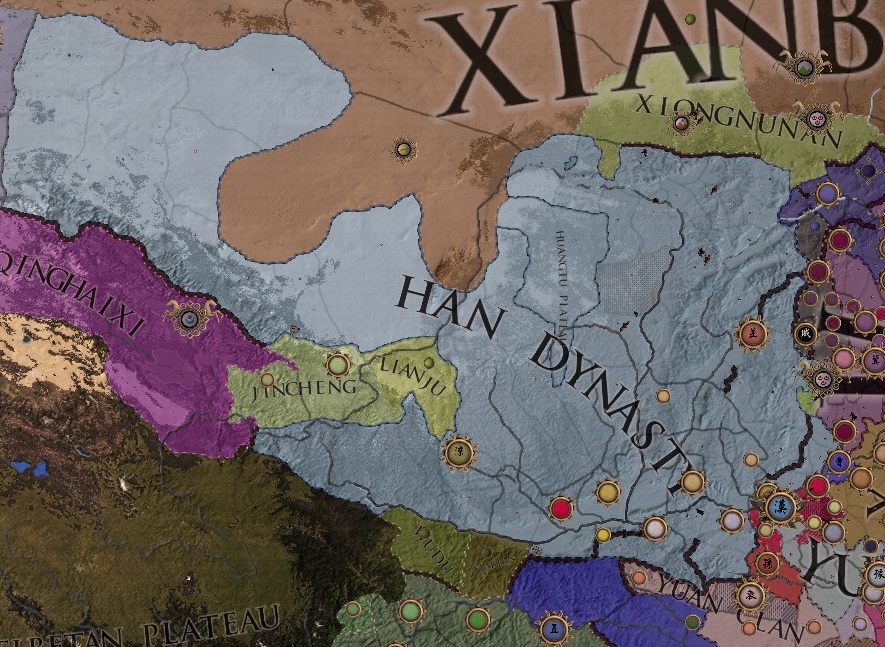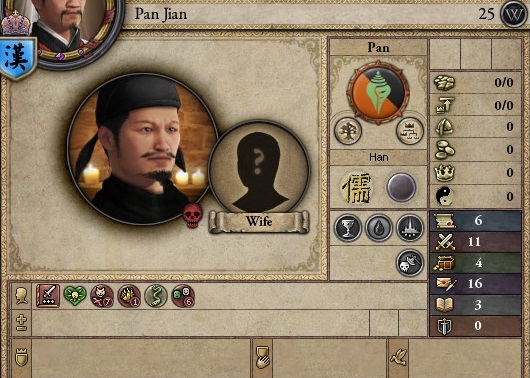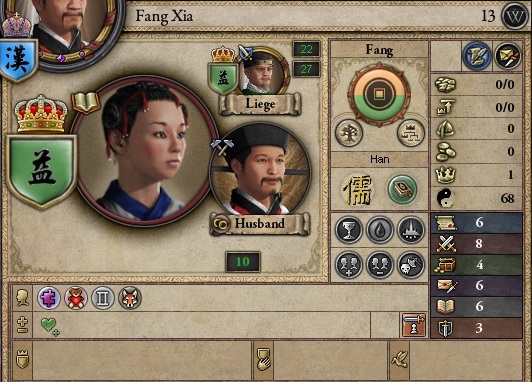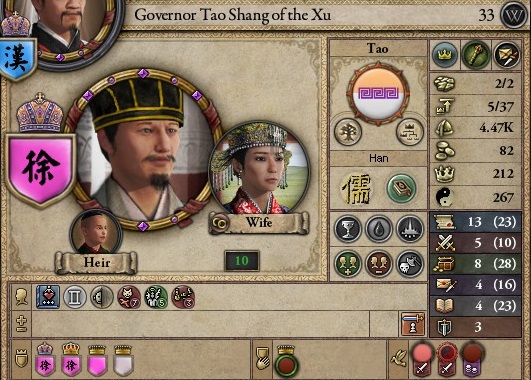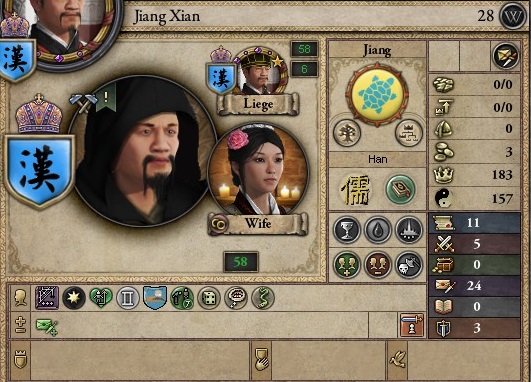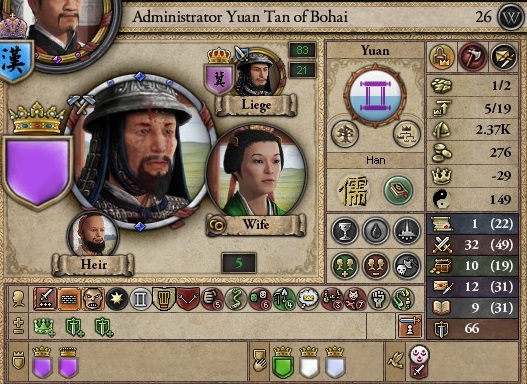193-194: TWELVE MONTHS OF REVOLT
When Liu He heard what his cousin had done, he was enraged.
Liu Siyuan was supposed to come to the provincial capital to explain himself, to ensure that their position at court wasn’t endangered by the rise of the Mi brothers. This little setback would be dealt with and Liu He would continue to be the top advisor of Xu Province, ensuring his control over Tao Shang. Instead, his cousin had chosen to conspire with the traitors of Yang Province, taking the stupidest decision possible and by choosing to rebel against Tao Shang. Now, if his cousin had simply rebelled alone, Liu He might have been able to brush this aside. But conspiring with Chen Wen? This was a big hit to the Liu Clan in the province. And now he had to find a way to use this in order to stay in Tao Shang’s good graces.

Tao Shang was shocked when he learned that both Chen Wen and Liu Siyuan had rebelled. He was previously convinced that his attempts at unifying his subjects had been working. He was as good as his father, after all, if not better. Of course, he had been annoyed when he learned that Chen Wen was expanding without authorization, but at least during the campaigns he chose to let it slide due to the wealth from the pillaging during the war. Some had expressed worries, but Tao Shang had always told them that it was better to wait and see, that in due time Chen Wen would prove loyal. But now Chen Wen was going to go into a revolt because he didn’t want to give Jing Province to Tao Shang? But the province rightfully belonged the liege. Wasn’t it natural that he received the province?
And then there was Liu Siyuan. What an ungrateful man. He had allowed him on his personal council in an attempt to mitigate the dispute with Mi Fang. And this was how he rewarded him? First he refused to come on the campaign against the barbarians because he was sick, then he illegally seized Mi Fang’s territories and refused to give them back, and now this! Tao Shang felt insulted and humiliated by Liu Siyuan, who had just spat at his generosity. If only he had listened to Mi Fang and Mi Zhu earlier, maybe this could have been avoided…
To Tao Shang’s surprise, Liu He asked to be allowed to lead the troops against the rebels. Tao Shang and the Mi brothers had obvious worries about Liu He taking command. Could he really be trusted? After all, his cousin was one of the enemies. But Liu He insisted that he was the Commandant of Xu Province. His cousin didn’t matter when compared to his duties to his lord. Of course, Liu He wasn’t just motivated by loyalty, if at all. He hoped to turn his victory against the rebels in enough political capital to remove the Mi brothers. Tao Shang, who had always been able to rely on Liu He so far, agreed to the demand. Liu He took over the troops and marched against the rebels, but not before sending a letter to the barbarian tributaries asking them to come support his campaign.
Meanwhile, the rebels had not been idle.
Yang Weili and
Hu Zan had wasted no time bringing back Liu Siyuan to Hefei so that he could meet with Chen Wen. The Inspector of Yang Province was quick to welcome the general and reaffirm the promises made by his envoys. Liu Siyuan would be an equal in this war and would be allowed to go his own way following their victory. Chen Wen proved welcoming enough to convince Liu Siyuan that he had made the right choice, although he did find the man a bit too arrogant and certain of himself.
The presence of the scion of the Han was helpful, as Chen Wen was not exactly rebel leader material. Thankfully, he had surrounded himself with people that would fight this war far better than he ever could. There was of course his strategist and friend Yang Weili, always willing to help his lord. The newly arrived Hu Zan was also proving to be an essential asset, and he hoped to repay the kindness showed to him by helping win this war. He even appointed Su Dai, the first administrator to submit to him, as the general in charge of defending Hefei and the surrounding areas. The Inspector also tried to call upon the generals of Jing Province to come help him in an attempt at unity. Among the generals who came, the most notable was Huang Zu, an angry and headstrong general who didn’t like Chen Wen personally. Quite the group he had assembled around himself.

There was a quick strategic meeting once everyone had assembled in Hefei, as Yang Weili wanted to make sure that everyone was on the same page on the issue. He hoped for a prudent and slow war, believing that with the resources of Jing Province they could win on the long run. Su Dai was quick to agree, and Hu Zan admitted that there was value in prudence. He had tried to play it fast during his attempted takeover of Qing Province and had failed.
“If I had done as General Yang suggest, I might have been in charge of Qing as we speak.” he explained, ignoring the fact that his defeat had been due to his lack of troops and diseases in his camps. This comment, meant to convince everyone to get on board, actually riled up Huang Zu, who spat on the ground and proclaimed
“You failed at your rebellion, General Hu. Let us make sure you do not fail ours.” Hu Zan took offense to this, but was smart enough to not get drawn into a dispute with Huang Zu, who continued by advocating a run to the provincial capital of Xu as fast as possible. You know, the exact tactic Hu Zan tried in his own revolt.

It was then that they received news of the barbarians. The previous year, Tao Shang had forced many of them to play tribute to him, and now he was calling upon them to help him in his time of need. Hearing this, Liu Siyuan quickly stood up from the table and declared that he would take his men (and as much as Chen Wen was willing to give) to go intercept the barbarians and stop them from joining force with Tao Shang. Su Dai told him that it might be a good idea to wait, but Liu Siyuan pointed out his success would mean one less problem for Su Dai to deal with, which the administrator was perfectly fine with. Chen Wen was moved by Liu Siyuan’s passion and gave him a few hundred men to had to his own. Yang Weili acquiesced to his lord’s orders, being too lazy to try to get in the way of Liu Siyuan’s desires. His opinion on the subject changed when Chen Wen declared that he wanted them to launch an all out offensive against Xu Province instead of adopting the defensive posture he suggested. Yang Weili quickly tried to convince Liu Siyuan to stay. If this was an offensive, all men would count. But Liu Siyuan bluntly answered
“I am not your subordinate.”
Liu Siyuan thus left with the troops given to him by Chen Wen and joined with his own troops, commanded by his personal strategist., Jiang Gong. Jiang Gong had been preparing the troops in his lord’s absence and was marching them toward Hefei when he weas told to instead link up on their way to fight the barbarians. Once linked, they had around 800 troops at their disposal. Jiang Gong, while completely loyal to his lord, did question the wisdom of abandoning the main force. Liu Siyuan explained that he had no desire to stay away permanently. He simply believed that the barbarians were a threat that had to be defeated first. Jiang Gong nodded in agreement, although he couldn’t help but notice how happy his lord seemed to finally have large war to fight. He was a passionate fighter, after all, and this would be his first battle against barbarians.


They finally found the barbarians in November. The barbarians were attacking the city of Lujiang right in the middle of their ransacking of the city. While the barbarians were more numerous, they were also less organized than Liu Siyuan’s army. He was quick to order an attack, heroically leading it as he slayed one barbarian after the other. Panicked to see this army charge into them as they were occupied pillaging, the barbarians were quick to flee and disperse. The battle was a bloody affair, fought in the streets of Lujiang, often with little space to manoeuvre or escape. Following the victory, Liu Siyuan was hailed as a hero by the locals, who threw a feast for him and his men. He enjoyed the celebration, but wished to pursue the barbarians even more to make sure they wouldn’t return as a threat later on. His plans were foiled by a messenger from the main army. To his surprise, Yang Weili had been progressing far faster than he had anticipated. Stuck with the choice of staying away or linking up with the main force, Liu Siyuan fatefully chose the later, taking the first of two decisions that would have disastrous consequences on the war.

Yes, Yang Weili had been progressing faster than anyone could have expected. However, this advance had been done against his will by one of the two generals seconding him. If Liu Siyuan could be considered obstinate, Huang Zu was proving to be bullheaded and unruly when it came to following Yang Weili’s orders. Huang Zu barely wanted for his commander to charge with a fourth of the army, abandoning Yang Weili and Hu Zan behind. Unwilling to let him have all the glory, Hu Zan was quick to force the pace of his troops to follow, which left the supply line disorganized and stretched far more than what had been planned before their departure. Yang Weili, instead of putting the work to rein in his two commanders AND ensure good supply, simply focused on having his troops ready for the worst. Logistics were already ruined, so why bother to fix the unfixable?

In Hefei, Chen Wen was ecstatic when he learned of Liu Siyuan’s victory. Emboldened by the news, he decided that he should go take part in the glory and lead troops himself. He already dreamed of leading brutal charges in his terrified enemies. Few of those left in the provincial capital were happy with this idea. Su Dai tried his best to plead to his lord that it was probably not the best idea to go. Better leave the generals do their own things. Chen Wen saw it as if Su Dai was saying that he wasn’t competent enough to lead troops and latched as his defence commanders. Thankfully, Lu Jun was also here to ensure that Chen Wen wouldn’t do anything stupid. Yes, Lu Jun had been opposed to the revolt since the beginning, but now that it was ongoing, he wanted to make sure that things wouldn’t go bad for himself and the province. And having the Inspector die on the battlefield was a worst-case scenario. He was blunt in reminding Chen Wen that his place was in Hefei, inspiring the troops from behind. After a few days of reminding this to him, Lu Jun was able to convince Chen Wen to stay back.

By the time Liu Siyuan finally reached with the rest of the army, he found a good part of them tired from the hard march toward Xu Province, no thanks to Huang Zu. It was April 194 and they were inside Tao Shang’s territories, yes, but the most soldiers were in no shape to fight. When he demanded an explanation of what was happening, he was actually told that Yang Weili had no arrived, and that he was in fact lagging behind by three days. He could indeed notice the tired soldiers arriving in camp every few hours. When he asked Hu Zan how this could have happened, the younger general was quick to spin this so to free himself from all blame. Instead, he put it solely at Huang Zu’s feet.
There was also one issue that couldn’t wait Yang Weili’s arrival. Liu He had installed his troops next to the town of Touzhong, the only town laying between their complete access to Xu Province. His army was currently larger than theirs, and without Yang Weili’s troops who had yet to fully arrive, Hu Zan doubted that they would be able to come out on top, or at least not without turning it into a pyrrhic victory. So he instead suggested that they open talks with Liu He in order to gain time. Huang Zu was opposed to this lowly tactic, which he called cowardly. But Liu Siyuan was convinced when Hu Zan appealed to his sense of duty to his Clan. If there was something Liu Siyuan cared as much as fighting, it was his Clan. He was convinced that maybe Liu he could be talked down, so that cousins wouldn’t have to fight. So both sides agreed to meet on neutral ground, somewhere inside Touzhong. The discussions between cousins went nowhere, though, as Liu He berated Liu Siyuan for siding with traitors against his lord, to which Liu Siyuan could only answer that it was the best path to help the Han Dynasty on the long run.
The only thing this accomplished was allowing Yang Weili to arrive with the rest of the troops. Realizing that this was the reason of the talks, Liu he was quick to launch an attack against the rebels. With Yang Weili’s troops still tired, the rebels found themselves in a difficult situation. Thankfully, their commanders had the talent to take them out of this difficult situation. Huang Zu and Liu Siyuan were surprisingly aggressive, taking Liu He’s force aback as they expected the rebels to go on the defensive. Meanwhile, Hu Zan proudly commanded the troops as Yang Weili tried to ensure that the stretched supply line wasn’t attacked. Liu Siyuan and Huang Zu both tried to make their way to Liu He, although only the former managed to reach his cousin. The old man ordered his bodyguards to protect him, but Liu Siyuan was quick to dispatch them, although with some efforts. Liu He’s horse panicked and threw him to the ground. As he got up with difficulties, he could see his cousin with his spear raised. But the warrior hesitated, and in the end, raised it down.
“Go.” he told Liu He.
“How ashamed our imperial ancestors would be if they saw us killing each other.”
Allowing Liu He to leave out of familial ties would prove to be Liu Siyuan’s second great mistake, as it allowed the Commandant to return to his camps and reorganize his weakened troops for the following day. The battle thus continued for five days, five days during which everyone was too focused on Liu He to spend time on scouts reports or the likes. Yang Weili certainly had other things to do, and the rest were too focused on glory or fighting to concentrate on such secondary affairs. So everyone was shocked when on the seventh day of battle barbarian tributaries arrived to reinforce Liu He. It turned out that their defeat at the hand of Liu Siyuan had only been temporary. This led to rebel defeat as the various generals failed to coordinate a coherent response to the barbarians’ arrival. Instead of pressing his advantage, Liu He chose to allow them to escape the battlefield. He didn’t want to let the rebel win too soon, after all. That would undermine his value to Tao Shang. No, he needed to be as indispensable as possible for as long as possible.

But one officer was suspicious of Liu He’s decision to let the rebels go, and so sent a secret missive to Tao Shang’s court to tell him of what had transpired. He quickly consulted the Mi brothers, who were just as quick to suspect Liu He of collusion with the rebels. Why else would Liu Siyuan spare him, after all? The fact that his cousin was one of the main rebels was already putting Liu he in a bad light. Now he had allowed them to escape so to fight another day. Mi Fang was quick to say that while Liu he had years of service under Tao Shang and his father Tao Qian, these actions could simply not be tolerated. Since the start of the rebellion, Mi Fang had become Tao Shang’s right-hand man, even receiving command of the Langye Commandery. So when he said that they should watch out for Liu He, Tao Shang listened.

They were given more reason to believe Liu He’s supposed treason only a month later. The rebels had retreated back into Yang Province, with Liu He closely behind. Once again, he was able to engage them in late May, and once again he was able to defeat them, in part due to disputes over who had to take the blame for the previous defeat. Huang Zu had the balls to put it all on Liu Siyuan. Feeling slighted, tensions grew up between the scion and the headstrong general, which hindered the strategy Yang Weili had worked out for the battle. But once again, Liu He allowed the rebels to leave, wishing to prolong the rebellion for his own advantage. He even executed an officer who disobeyed his order and launch a charge which succeeded in capturing one of the main officers of the rebel army.
When Tao Shang heard of this missed opportunity, he had Liu He recalled to court in June. This put a stop to his advance, which gave some breathing room to the rebels. When he arrived, Liu He was charged with treasons and conspiring with the rebels. Shocked at this, he tried to maneuver his way out of this by blaming it on the nasty influence of the Mi brothers. But Mi Fang was convinced of Liu He’s guilt by that point and made sure that he would no longer be a threat to Tao Shang. In July 194, a full year after Chen Wen went into revolt, Liu he was executed on Tao Shang’s orders, with Mi Fang replacing him as Commandant of Xu Province and leader of the troops fighting the rebellion. When news of this reached Liu Siyuan, he had his troops put mourning clothes and had a funeral for his cousin, a controversial call as it was for an enemy of their rebellion. Clothed in white, on his knees in front of the funerary tablets and tears in his eyes, Liu Siyuan made an oath to his cousin:
“I shall avenge your death, He. I shall do what should have been done last year. I shall slay Mi Fang myself so that your honor be restored.”















